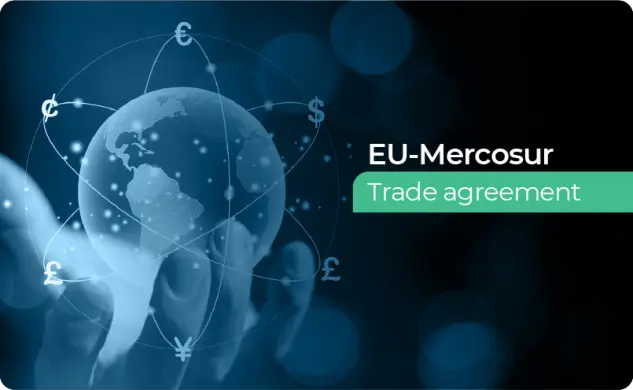- Lilian Retel
- Customs & Trade Advisor
- l.retel@gaston-schul.com
- Follow on Linkedin
Get REX ready with our (R)expertise.
- Wed, June 18, 2025
- 3.5 minute read
Any economic operator engaged in international trade inevitably faces customs regulations, preferential origin rules, and tariff structures. By reviewing and optimising internal processes, it is often possible to operate more efficiently within the legal framework – resulting in shorter lead times, less administrative hassle, and, in many cases, lower import duties for both the operator and their customers.

Authored by: Lilian Retel - Customs & Trade Advisor, Gaston Schul
The hidden complexity behind customs authorisations
Many of these benefits can only be realised if the economic operator holds the appropriate customs authorisations. While applying for such authorisations may often seem as simple as completing a form, the reality is far more complex. Customs authorities impose strict conditions, require detailed procedural documentation, and carry out pre-audits to assess whether a company can handle the associated responsibilities. Applying for a customs authorisation is, therefore, not just a matter of answering a few questions – it’s a project that must be carefully prepared and executed.
The low-barrier risks of REX registration: Simplicity with serious consequences
Surprisingly, this careful approach does not apply to all customs schemes. One clear exception is the REX registration (Registered Exporter). Under this system, exporters are allowed to self-issue statements of preferential origin, which directly affect the amount of import duties paid by the customer and therefore financial consequences. And yet, all that is required to obtain a REX number is to fill out a simple form; no pre-audit, no prior assessment, and no mandatory knowledge check are required. Despite the potentially serious financial and legal consequences of an incorrect origin statement, the level of control under this scheme is significantly lower than in others.
Preferential vs non-preferential origin – What’s the difference?
In international trade, we distinguish between two types of origin:
- Preferential origin entitles goods to reduced or zero import duties under a trade agreement, such as CETA (EU–Canada) or the EU–Vietnam agreement. To qualify, goods must meet specific origin criteria set out in the relevant origin protocol of the agreement.
- Non-preferential origin is used for purposes such as trade statistics, labelling, or the application of trade defence measures (e.g., anti-dumping duties). It is generally based on the criterion of substantial transformation.
Avoiding penalties through accurate preferential origin declarations
Correctly determining the origin of goods is essential. An inaccurate or unjustified origin declaration can lead to reassessments, penalties, or exclusion from preferential treatment because your registration is cancelled.
Understanding origin rules: Tariff shift, value added, and processing requirements
When issuing a preferential origin statement, the exporter is declaring that the goods meet the conditions of the relevant trade agreement. These conditions, detailed in origin protocols, vary by product.
Contrary to what some may assume, just processing a product does not automatically grant it a new origin status. Even complex manufacturing activities performed in a country do not automatically result in that country being considered the country of origin of the product, especially when the materials used are sourced from outside that territory.
The origin rules may require, for example:
- A change in tariff heading after processing (tariff shift rule);
- A minimum percentage of value added (value rule);
- Or a specific manufacturing operation to be carried out in a certain territory (processing rule).
Each origin statement, whether on an invoice or other commercial document, implies that these criteria have been correctly assessed and met.
And yet… when issuing a REX number, Customs does not check whether the exporter understands these rules, or the risks involved. This makes the system vulnerable and increases the likelihood of misuse or unintended non-compliance.
Post-registration customs audits: Are you really compliant?
What many businesses don’t realise is that Customs can, and will, carry out post-audits after the REX number has been granted (and after the issuing of origin statements by the exporter has started), to assess whether origin statements were properly issued. These post-registration audits verify ongoing compliance with REX requirements and require that the origin of goods is fully substantiated with supporting documentation.
If, at that point, economic operators are unable to prove that their products truly meet the origin criteria, they are – perhaps unknowingly – in breach of the conditions of their registration. This constitutes an economic offence, with serious consequences: reassessments, financial penalties, reputational damage, and potential withdrawal of your REX status. Moreover, the use of an incorrect origin statement by the buyer can result in the payment of full import duties, potentially applied retroactively to past shipments. This not only leads to financial impact but can also severely damage the commercial relationship between seller and buyer.
In short: just because REX registration is easy doesn’t mean issuing preferential origin statements is.
REX ready?
Being REX ready means: having control over your processes, a watertight administration, and full awareness of what you’re declaring. The simplicity of the REX registration process does not absolve the economic operator from their responsibilities.
At Gaston Schul Advisory, we support you in taking full control of your REX responsibilities. Based on our expertise, we identify potential risks, help you interpret and apply the preferential origin rules, assess your products, and review your internal procedures. This ensures that your organisation is truly REX ready. This approach helps ensure full compliance with preferential origin requirements – before the authorities initiate a post-registration audit of your origin declarations.
Is your business truly REX ready?
Get expert support in managing origin declarations and avoiding costly compliance risks. Contact our customs experts for advice and support by filling out the form on the right. A member of our team will respond within one business day.
Related News & Articles
Get our expert insights and customs resources delivered straight to your inbox
By subscribing, you consent to be contacted by Gaston Schul about our relevant content, products and events. You can opt-out at any time. For more information, please see our privacy policy.




